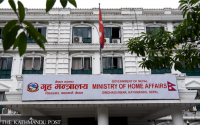National
Filing complaints with the police is filled with hassles
Nepal Police’s behaviour with people seeking help from the authorities has frequently come under the scanner..jpg&w=900&height=601)
Shuvam Dhungana
On Monday, Indra Hang Rai, a member of the All Nepal National Free Students Union allegedly raped an 18-year-old girl by luring her to his relative’s home at Makalbari on the pretext of Tihar celebrations.
After consulting her sister, the girl decided to file a complaint against Rai the same night but found the police to be disinterested. When the victim dialled 100, an emergency police contact number, the Sano Thimi Police first responded to the call, but after knowing the incident took place in Makalbari, they told her to call the Boudha Police Station to file a complaint, the girl said speaking to Kantipur daily on Wednesday.
[Read: Student leader from ruling party arraigned on rape charge]
“Since the incident occurred in Makalbari and I was at Kaushaltar at that time, the Sano Thimi Police, after picking up the phone and listening to the complaint, told me to call the Boudha Police Station as the incident did not occur in their area,” the girl said in the Kantipur piece. “It was already 1:30am, and after searching the number of the Boudha Police Station, we made a call to file a complaint, but they replied that it was already too late in the day, so come in the morning to file a complaint.”
However, Senior Superintendent of Police Uttam Raj Subedi, chief at the Kathmandu Metropolitan Police Range, said they had investigated and no serious negligence on the part of the police was found. He, however, admitted that there were some minor flaws in police’s handling of the matter and said that they are working on correcting it.
The Makalbari rape case is the latest in which dilly-dallying of the police hindered victims of all sorts of crime from a filing a complaint immediately after the incident.
Nearly six months ago, 23-year-old Akash Shrestha of Kathmandu had a similar experience. Shrestha was injured after his motorcycle was hit by another bike in Maharajgunj. The police seized both the bikes after the incident. The next day, he went to the police station to file a complaint against the other rider, hoping to receive compensation to repair his bike. But the treatment he received at the police station left him feeling even more helpless.
“I told everything about the incident to one police officer after which I was asked to repeat the entire incident to another officer,” Shrestha recalled. “After listening to it, the police told me to come the next day to speak with senior officials.”
The experience with the police left me exhausted, especially with the authorities delaying investigation and then asking him to come to the station every day for a week when they finally did start looking into his complaint.
“It was only when I told my uncle, who is also in the police, about my complaint that the officers began taking it seriously,” he said. “Nepal Police needs to change the way they behave with the general public because they work sincerely only when they are ordered by the higher-ups.”
The Nepal Police headquarters comes up with new campaigns every year, ostensibly to improve the police-public relationship. For instance, it launched a campaign with the slogan ‘Har Prahar Gau Ra Nagari, Tol Tol Ma Nepal Prahari’ (Every hour, Nepal Police in every village, municipality and neighbourhood). But this campaign, it seems, has done little to change the way the commoners think about the police. The police have also started a community-police partnership programme, Subedi added.
Last October, the police organisation launched the programme to strengthen its coordination with various communities. However, the dissatisfaction of commoners towards the police force shows that the programme has worked very little.
Many seem dissatisfied with the behaviour of policemen who, they say, are rude to a majority of the general public. But Nepal Police has repeatedly vowed to change.
“The rude behaviour of police towards the public is a serious matter and we are regularly working on it to improve the police’s image. We have instructed our personnel to behave politely with the service seekers and are conducting various programmes where we train them,” said SSP Subedi, chief ot the Kathmandu Police Range. “If we receive such complaints from the public, we take strict action against those personnel.”




 12.32°C Kathmandu
12.32°C Kathmandu














